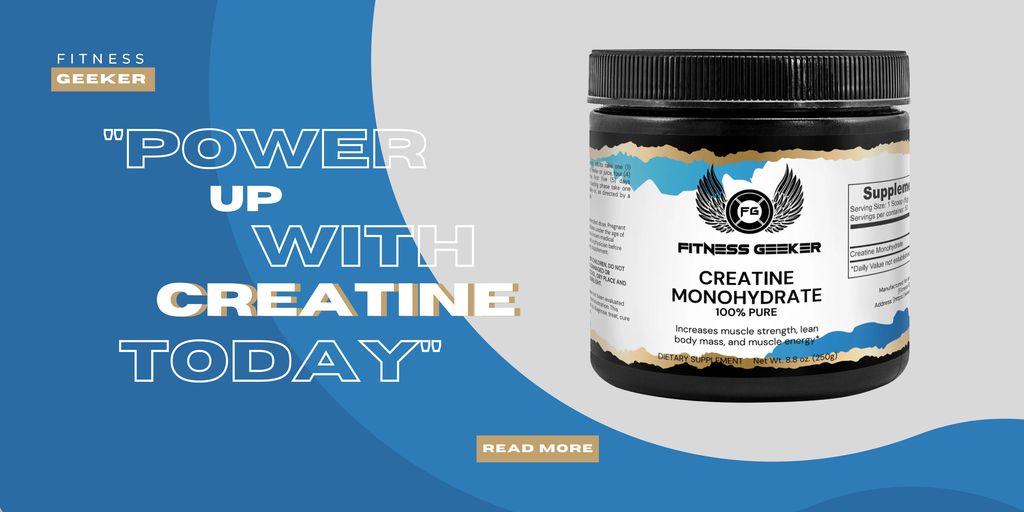"Power Up with Creatine Today" - Muscle Growth, Boost Brain Function, Bone Density

10 Benefits of Creatine
In today's health and fitness world, people are constantly looking for ways to improve their physical performance and body composition. One supplement that has gained a lot of attention is creatine. Creatine is a naturally occurring compound found in the body and also available as a dietary supplement. In this article, we will explore the top 10 benefits of creatine and how it can help you improve your physical performance.
- Increased Muscle Mass:
Creatine is well known for its ability to increase muscle mass. When taken as a supplement, creatine can help to increase muscle size and strength by promoting the growth of muscle fibers. This is due to creatine's ability to increase the production of ATP, which is the primary source of energy for muscle contractions. By increasing ATP levels, creatine can help to improve muscle endurance and reduce fatigue.
2. Improved Strength:
In addition to increasing muscle mass, creatine can also improve strength. Studies have shown that creatine supplementation can lead to significant improvements in strength, particularly in high-intensity, short-duration exercises like weightlifting and sprinting. This is because creatine helps to increase the amount of energy available to muscles during these types of exercises.
3. Enhanced Endurance:
Creatine supplementation has also been shown to improve endurance. This is because creatine can help to reduce the amount of energy that is used during exercise, which can help to delay fatigue and improve endurance. Creatine can also help to increase the production of ATP, which is essential for endurance exercise.
4. Increased Energy:
Creatine is also known for its ability to increase energy levels. This is because creatine helps to increase the production of ATP, which is the primary source of energy for the body. By increasing ATP levels, creatine can help to improve energy levels, reduce fatigue, and improve overall physical performance.
5. Improved Cognitive Function:
Creatine has also been shown to improve cognitive function. Studies have found that creatine supplementation can help to improve memory, concentration, and mental alertness. This is because creatine can help to increase the production of ATP in the brain, which is essential for cognitive function.
6. Improved Recovery:
Creatine can also help to improve recovery after exercise. This is because creatine can help to reduce inflammation and oxidative stress, which are two factors that can contribute to muscle damage and delayed recovery. Creatine can also help to improve the delivery of nutrients to muscles, which can help to speed up the recovery process.
7. Reduced Risk of Injury:
Creatine supplementation has also been shown to reduce the risk of injury. This is because creatine can help to improve muscle strength and endurance, which can help to prevent injuries caused by fatigue and weakness. Creatine can also help to reduce inflammation and oxidative stress, which are two factors that can contribute to injury.
8. Improved Bone Health:
Creatine has also been shown to improve bone health. Studies have found that creatine supplementation can help to increase bone mineral density, which can help to reduce the risk of osteoporosis and other bone-related conditions. This is because creatine can help to improve the production of collagen, which is essential for bone health.
9. Improved Heart Health:
Creatine can also help to improve heart health. Studies have found that creatine supplementation can help to reduce blood pressure, improve blood flow, and increase the production of nitric oxide, which is essential for cardiovascular health. This is because creatine can help to improve the delivery of oxygen and nutrients to the heart and other organs.
10. Reduced Risk of Diabetes
Studies have also shown that creatine supplementation may help reduce the risk of developing type 2 diabetes. Type 2 diabetes is a chronic condition characterized by high blood sugar levels and insulin resistance.
Research suggests that creatine can help improve glucose tolerance and insulin sensitivity in both healthy individuals and those with type 2 diabetes. In one study, participants with type 2 diabetes who supplemented with creatine for 12 weeks saw a significant improvement in their blood sugar control and insulin sensitivity.
Creatine may also help reduce the risk of diabetes by promoting the growth of muscle tissue. Muscle tissue is a major site for glucose uptake and utilization, and increasing muscle mass may help improve glucose control and reduce the risk of insulin resistance.
Conclusion:
Overall, creatine is a safe and effective supplement that offers numerous benefits for physical performance and overall health. From improving muscle strength and endurance to reducing the risk of diabetes, creatine can help individuals reach their fitness and health goals.
As with any supplement, it is important to consult with a healthcare professional before beginning creatine supplementation. Dosage and timing recommendations may vary based on individual needs and goals.
By incorporating creatine supplementation into a well-rounded fitness and nutrition plan, individuals can maximize their physical performance and health potential.


Leave a comment